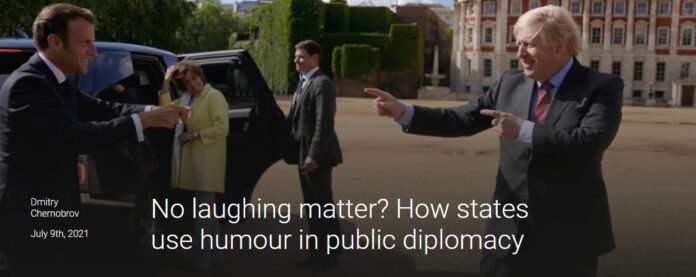In today’s digital media environment, how a story is told can be no less important than whether the story is true. Dmitry Chernobrov explores how states use humour strategically as a tool of post-truth public diplomacy to promote narratives that advance state interests, deflect criticism, and shape opinions about contested events.
When western governments and media accused Russia of interfering in the 2016 US presidential election, Moscow responded with humour. Russia’s external broadcaster RT ran adverts stating ‘Missed the train? Lost a vote? Blame it on us!’ and ‘Watch RT and find out who we are planning to hack next’. During the 2020 presidential election campaign, RT jokingly offered Donald Trump a job.
Russia’s officials and state media have also repeatedly mocked western politicians for being duped by pro-Kremlin pranksters. Prank calls claiming that Russia is interfering in fictitious countries have been used to show that western governments are all too eager to support made-up accusations against Russia and impose sanctions under false pretences. Russia’s embassies frequently tweet viral humorous messages intended to fight off criticism, challenge the claims of Russia’s opponents, and turn accusations of propaganda into a joke.
Russia is not alone in using humour to try and shape domestic and international public opinion about controversial international events. Israel has employed humour in public diplomacy campaigns to defend the country against external criticism, while Poland used humour to mock Britain’s Brexit position, and Canadian and US embassies have both produced viral memes ridiculing Russia’s actions in Ukraine. In all these cases, the messages reached a wider and more diverse public. They were picked up by news media and helped promote state narratives in a way that dry, official statements often fail to do.
Strategic humour
Humour has a long history in politics and propaganda. Yet with social media, public diplomacy has changed – and short, newsworthy, memorable, easily shareable sarcastic messages have become an increasingly popular way of communicating foreign policy to citizens and waging the war of narratives.
Humour is rarely taken seriously – and paradoxically, this makes it a useful instrument for testing or delivering serious messages. Stories told through humour – from jokes about politicians and nations to viral memes – are among the most widely circulated and best remembered.
Research shows that political comedy is better recalled by audiences than news and increasingly represents a source of news. The accuracy and truthfulness of humorous claims are not scrutinised as closely (after all, they are just a joke), making them easier to reproduce and harder to challenge. Humour can provide fruitful ground for voicing controversial ideas, sustaining stereotypes, feeding conspiracies, affirming identity boundaries, diminishing opponents, and creating hierarchies.
In a recent study, I introduce the concept of strategic humour – the use of humour by state and proxy actors to promote instrumental interpretations of contested international events to domestic and foreign audiences. The concept highlights two principal aspects: the use of humour as a strategy of communicating and framing contested international issues to the advantage of a particular actor, and the choice of humour for its ability to maximise outreach and engage audiences emotively. Importantly, humour does more than simply describe an isolated event – it often weaves it into a wider political script and links its perception to popular and recognisable cultural symbols.
Through humour, states frame events in ways that advance state interests, deflect criticism, legitimate policy, and challenge the narratives of others to achieve foreign policy goals. Although powerful or well-respected states use humour too, it can be an asymmetrical tool of influence where traditional power resources have been limited or constrained.
For example, Russia has used humour to frame some of the most problematic issues in its relations with the West, where it finds itself politically isolated, mistrusted, sanctioned, unfavourably portrayed by foreign media, and regarded as a revisionist power. In different cultures, humour has long been the weapon of the oppressed, a tool to resist dictators or hegemony. Today, some states use humour strategically, to claim a similar symbolic position of resisting internationally dominant media and political discourses.
Strategic humour drives post-truth public diplomacy. It is characterised by emotive messaging, the construction and exploitation of uncertainty, and the pursuit of popularity as a mechanism of asserting truth claims. Yet it does not necessarily construct falsehoods – mocking opponents invites the audience to doubt their trustworthiness, expose their hidden motives, further feeding the uncertainty around contested events. Such humour enables states to contrast internationally mainstream interpretations and one’s own ‘truth’ which it asserts through popular humorous style rather than factual evidence.
Finally, humour in public diplomacy targets wide – and blurred – audiences. The distinction between domestic/foreign publics, traditionally central to the strategies of influence and persuasion, is giving way to online/offline. Through active use of digital tools, states use humour to shape both domestic and foreign public opinion. And although the persuasive power of humour (and more broadly, propaganda) can be disputed, humour maximises the quantity, if not the quality of public diplomacy outreach.
For more information, see the author’s accompanying study in the British Journal of Politics and International Relations and his recent book, Public Perception of International Crises
Note: This article gives the views of the author, not the position of EUROPP – European Politics and Policy or the London School of Economics. Featured image credit: Andrew Parsons / No 10 Downing Street (CC BY-NC-ND 2.0)








